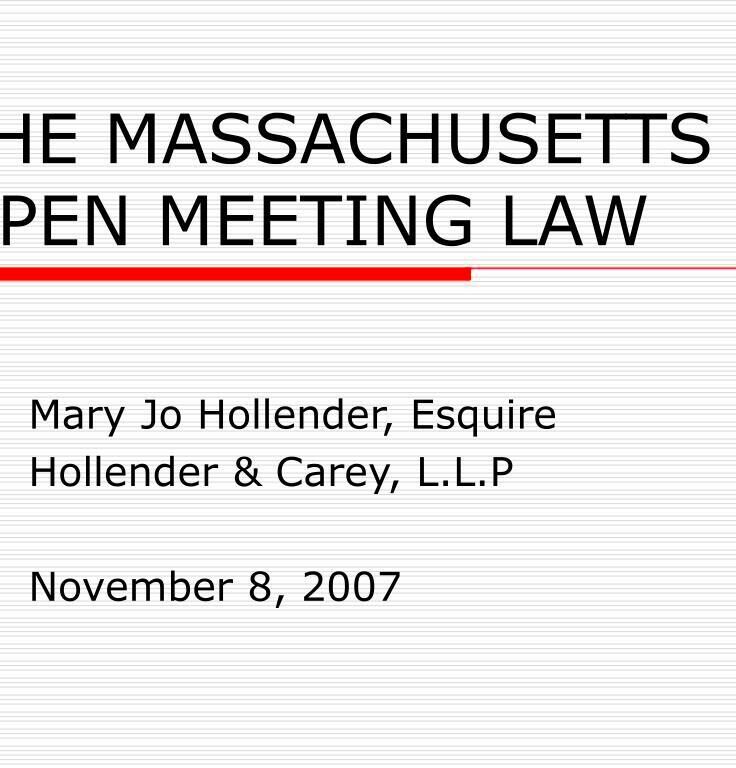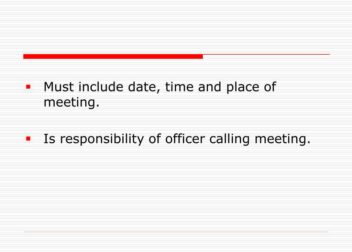A Guide to Massachusetts Open Meeting Law
The Massachusetts Open Meeting Law is meant to guarantee that governmental meeting held publicly take place without any hidden agendas. It requires that all meetings held by such constitutionally recognized bodies be open to everyone thus enabling them (citizens) to have a say in what is happening with their government. This law ensures visibility of decision making for the relevant society that it impacts so as maintain clarity and responsibility at levels of authority.The main goal of the Massachusetts Open Meeting Law is to promote transparency and public involvement in government activities. Its specific objectives include:When the government operates in an open and transparent manner, it enhances the trust between the community and its public office bearers. These principles form the basis of the Open Meeting Law.
The Massachusetts Open Meeting Law is applicable to numerous public institutions and public officers. More pointedly, it necessitates compliance by:In keeping with the Open Meeting Law, these entities must ensure that their gatherings remain open to the general populace and well advertised besides being held with transparency. Otherwise they may be subject to lawsuits and public confidence in government operations may be compromised.
Purpose and Goals of the Law
- Ensuring Public Access: All meetings of public bodies must be held in a manner that the public can attend and observe.
- Promoting Transparency: Decisions and discussions of public bodies should be visible to ensure accountability.
- Encouraging Public Participation: The law provides opportunities for citizens to voice their opinions and contribute to decision-making processes.
- Preventing Secret Meetings: It prohibits deliberations on public business outside of properly noticed meetings to prevent secretive decision-making.
Who Needs to Comply with the Open Meeting Law
- Public Bodies: This includes boards, commissions, committees, and other groups that are created by statute or appointed by a public official.
- Local Government Officials: Elected or appointed officials at the municipal level must follow the law in their meetings.
- State Agencies: Various state departments and agencies that conduct meetings to discuss public business must adhere to the law.
In accordance with the Massachusetts Open Meeting Law, a number of essential stipulations have been put in place specifically for public entities to follow so as to promote openness and ease of access. Listed below are these requirements:Following such stipulations make sure that public agencies are run openly while the individuals can see how their communities’ decisions are being made.To conform to the Massachusetts Open Meeting Law, it is very important to properly notify officers. Effetive notification can be achieved by doing the following:Sufficient announcement guarantees that all participants are conscious of and can show up in public gatherings encouraging openness as well as citizen involvement.When it comes to following the Massachusetts Open Meeting Law for meetings there are several crucial law rules that should be adhered to.In this way, following these rules, all public entities hold fair and open meetings in accordance with Open Meeting Law requirements.
Key Requirements for Compliance
- Meeting Notices: All meetings must be publicly announced at least 48 hours in advance, excluding weekends and holidays. Notices should include the date, time, location, and agenda of the meeting.
- Accessible Locations: Meetings must be held in places that are accessible to all members of the public, including individuals with disabilities.
- Open Meetings: Meetings should be conducted in open sessions, allowing the public to attend and observe. Private or executive sessions are allowed only under specific circumstances.
- Minutes and Records: Accurate minutes of each meeting must be recorded and made available to the public. These minutes should include a summary of discussions, decisions made, and votes taken.
- Public Participation: The law encourages public participation, providing opportunities for individuals to express their opinions during meetings, especially on agenda items.
How to Properly Notify the Public
- Advance Notice: Provide at least 48 hours’ notice before a meeting, excluding weekends and holidays. This notice should be posted on the public body’s website, if available, and in a location that is accessible to the public.
- Content of Notice: Include essential details such as the meeting date, time, location, and agenda. The agenda should outline the topics to be discussed, allowing the public to prepare for the meeting.
- Posting Requirements: Notices should be posted in a designated location, such as a municipal building or on the public body’s website, where they are easily visible to the public.
- Additional Methods: In some cases, additional methods of notification, such as email or social media, may be used to ensure broader dissemination of the meeting information.
Rules for Conducting Meetings
- Meeting Format: Meetings should be conducted in a format that allows public observation and participation. This typically means holding meetings in a public place and following a structured agenda.
- Executive Sessions: Executive sessions, which are closed to the public, are only permissible for specific purposes, such as discussing sensitive matters related to personnel or legal issues. These sessions must be announced in open meetings, and the reason for the closed session should be cited.
- Order and Decorum: Meetings should be conducted in an orderly manner, with respect for all participants. The presiding officer should manage discussions and ensure that all members have the opportunity to speak.
- Public Participation: The public must be given the opportunity to participate in meetings. This typically involves allowing time for public comments or questions, especially on agenda items.
- Decisions and Votes: All decisions and votes must be conducted openly. The results should be recorded in the meeting minutes and made available to the public.
Executive sessions are private meetings held by public bodies to discuss sensitive issues that cannot occur in open sessions. The Massachusetts Open Meeting Law allows for executive sessions under specific conditions. Here’s the best way to handle them:So that public entities could be able ensure that executive sessions follow the law, as well as promote their operations’ transparency and accountability.Conformity to Massachusetts Acts of Open Assembly is liable to bear weighty repercussions on public bodies and their representatives.That is to say, commitment to openness as enshrined in the law governing open meetings is an important strategy meant to uphold public governance and avoid some of its possible consequences.Few frequently asked questions regarding Massachusetts Open Meeting Law are:This FAQ answers typical questions, clarifies common doubts and ensures a better understanding of what is required by the Massachusetts Open Meeting Law in terms of how it functions or operates.
Handling Executive Sessions
- Authorization: Before entering an executive session, the public body must vote in an open meeting to go into executive session. The vote must be recorded in the meeting minutes.
- Specific Reasons: Executive sessions are allowed for particular reasons such as discussing personnel matters, pending litigation, or contract negotiations. The reason for the session must be clearly stated and documented.
- Limited Discussion: Discussions during executive sessions should be limited to the topics specified in the notice. No other business should be conducted during this time.
- Confidentiality: Information discussed in executive sessions must remain confidential and should not be disclosed to the public. This ensures that sensitive issues are handled appropriately.
- Recording and Minutes: Although executive sessions are not open to the public, minutes must still be taken. These minutes should be kept confidential but available to those with a legitimate interest or legal right to access them.
Consequences of Non-Compliance
- Legal Actions: Individuals or groups may file complaints with the Attorney General’s Office if they believe there has been a violation. The Attorney General has the authority to investigate and take legal action if necessary.
- Invalid Decisions: Decisions made during non-compliant meetings may be deemed invalid. This can lead to the need for re-discussion or re-voting on issues, potentially delaying decision-making processes.
- Fines and Penalties: Public bodies or members may face fines or penalties if found in violation of the law. These financial consequences can impact the budget and resources of the public body.
- Damage to Reputation: Non-compliance can damage the reputation of the public body and its members. It may lead to a loss of public trust and confidence in the government’s commitment to transparency and accountability.
Frequently Asked Questions
- What qualifies as a public body under the Open Meeting Law? Public bodies include boards, commissions, committees, and other groups created by statute or appointed by a public official. They are required to follow the law’s provisions.
- Can meetings be held virtually? Yes, virtual meetings are allowed as long as they comply with the law’s requirements for public access and participation. Notices and minutes must also adhere to the same rules as in-person meetings.
- What should be included in meeting minutes? Meeting minutes should include the date, time, and location of the meeting, names of attendees, a summary of discussions, and the results of votes. They should accurately reflect the meeting’s proceedings.
- Are there any exceptions to public access? Yes, executive sessions are an exception. They can be closed to the public but must be held for specific reasons and follow proper procedures for authorization and documentation.
- How can I file a complaint about a possible violation? Complaints can be filed with the Massachusetts Attorney General’s Office. The complaint should detail the alleged violation and provide any supporting evidence for investigation.
The crucial component of the Massachusetts Open Meeting Law is executive sessions which enable public bodies to hold private discussions on sensitive issues. These meetings can be both legal and effective if handled properly. There are some important guidelines:If public entities stick to these measures, then executive meetings will be held within the law and open while ensuring privacy of classified details.Public bodies and their members who do not comply with the Massachusetts Open Meeting Law may face serious repercussions. The possible effects consist of:Following the Open Meeting Law is very important for a good public governance as it maintains its legality and effectiveness, thereby preventing these dangerous results.Some typical queries in the context of Massachusetts Open Meeting Law have their answers here:This FAQ section is meant to clarify a few things that are often troubling people while making sure that the Massachusetts Open Meeting Law is well understood and constitutes its application.Transparency and accountability in public governance necessitate the comprehension and compliance with Massachusetts Open Meeting Law. Public bodies can effectively serve their communities while avoiding legal and reputational issues by adhering to the law’s requirements on meeting notifications, executive sessions as well as public participation.
Handling Executive Sessions
- Proper Authorization: Before convening an executive session, the public body must vote in an open meeting. The vote should be recorded, including the reason for the closed session, as outlined in the law.
- Legitimate Purposes: Executive sessions are permitted for specific reasons such as discussing strategy in litigation, personnel matters, or certain contract negotiations. The reason for the session must be stated publicly before entering the executive session.
- Limited Scope: The discussion during an executive session must be confined to the stated purpose. No other topics should be addressed to ensure compliance with the law.
- Confidentiality: Information discussed in executive sessions must remain confidential. This confidentiality is crucial to protect sensitive information and maintain the integrity of the process.
- Documentation: Minutes of executive sessions must be taken, though they are not typically made public. They should accurately reflect the discussions and decisions made, and be kept secure.
Consequences of Non-Compliance
- Legal Penalties: Violations of the law can lead to legal actions initiated by individuals or groups. The Attorney General’s Office may investigate and impose sanctions if violations are found.
- Invalidated Decisions: Actions taken during non-compliant meetings may be rendered invalid, requiring re-evaluation or re-voting, which can disrupt the decision-making process.
- Fines: Financial penalties may be imposed on the public body or its members, which could affect the body’s budget and operational resources.
- Reputational Damage: Non-compliance can erode public trust and damage the reputation of both the public body and its members, undermining confidence in governmental processes.
Frequently Asked Questions
- Who is considered a public body? A public body includes any board, commission, committee, or other entity created by statute or appointed by a public official that conducts public business.
- Can meetings be held remotely? Yes, remote meetings are permissible if they meet all transparency and accessibility requirements set by the law, including proper notice and the ability for the public to participate.
- What should meeting minutes include? Minutes should capture the meeting date, time, location, attendees, a summary of discussions, decisions made, and votes taken.
- What are the restrictions on executive sessions? Executive sessions must be held for specific reasons, such as discussing sensitive legal matters, and must be pre-approved in an open meeting. Discussions should be limited to the stated purpose.
- How can I report a violation? Complaints about potential violations can be filed with the Massachusetts Attorney General’s Office, which will investigate and address any substantiated claims.


